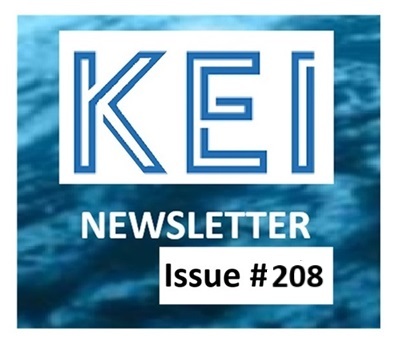|
|
DIRECTORY | ||
|
Contributions: AI Retooling Public Services webinar recording |
Action: Help sustain KEI's contributions |
Fact or Fiction?
An Unimaginable Future |
|
|
Editor - Perry Kinkaide |
The turmoil trumped up by the US musing that Canada become a 51st state is getting headlines. What continues to be ignored, is the serious threat to Canada's sovereignty from within. Canada for too long has ignored it's internal threats and opportunities.
The threats and missed opportunities surfaced during the Sovereignty dinner discussions we hosted at the end of January in Edmonton and at the end of February in Calgary. The concerns are echoed in Alberta's ultimatum last week to the Federal Government and the implications including Sovereignty. - Editor |
||
|
Canada’s Sovereignty Under Siege—From Within and Without The White House’s recent musings about Canada as the “51st state” might have been dismissed as little more than rhetorical bravado—if not for the accompanying economic and political aggression. With Washington slapping tariffs on Canadian goods and stoking fears of illegal immigration and fentanyl pouring across the undefended border, these actions signal more than just a diplomatic spat.
But while many Canadians bristle at this external threat, a far more insidious challenge to sovereignty is already at play: a country divided against itself. The upcoming federal election will be a referendum on this internal division. The growing East-West divide—rooted in deep cultural, economic, and political differences—may ultimately do more to undermine Canada’s unity than any pressure from Washington.
A Nation at Odds with Itself. Canada has never been a monolithic entity. Ontario and Quebec, with their deep historical ties to Britain and France, have shaped a nation that is urban, progressive, and internationally minded. Their economies—driven by finance, technology, and manufacturing—align more closely with European social democracy than with the free-market ethos of the West. Federal policies on climate change, social programs, and foreign affairs overwhelmingly reflect Eastern priorities, often to the frustration of Western Canada.
Meanwhile, the West remains deeply tied to resource development, agriculture, and frontier pragmatism. Alberta and Saskatchewan, in particular, have chafed under federal policies they see as strangling economic growth. The Liberal government’s push to phase out fossil fuels, restrict pipelines, and enforce strict emissions regulations has fueled anger among Western Canadians who feel their livelihoods are under attack. British Columbia, despite its left-leaning coastal cities, also maintains deep economic and social ties with the U.S. Pacific Northwest. - continued below
No Need to Register. Just Zoom in https://us02web.zoom.us/j/84258596166?pw.. - continued from above These divisions are not just theoretical. Polling consistently shows that Western Canadians are more sympathetic to American economic policies, while Eastern Canada remains more aligned with European-style governance. This fault line—never fully healed—has widened in recent years, with Western provinces openly questioning whether their future is better tied to Ottawa or to their southern neighbors.
The North: Canada’s Sovereignty Crisis in Waiting. While much attention is given to East-West divisions, Canada’s North represents an equally urgent sovereignty challenge. The region, which holds an estimated $3 trillion in untapped economic wealth in minerals, oil, gas, water, and forests, remains largely undeveloped and undefended. Successive federal governments have ignored the North’s economic potential and failed to invest in its defense, leaving the region vulnerable to foreign influence.
1. National Security and Arctic Defense. Canada’s Arctic sovereignty is under increasing threat as Russia and China expand their military and economic presence in the region. Meanwhile, the United States has signaled its impatience with Ottawa’s inaction, strengthening its own Arctic security posture through NORAD and increased military infrastructure in Alaska. Without significant investment in Arctic patrols, icebreakers, and surveillance, Canada risks having its northern frontier dictated by external powers rather than its own government. 2. Economic Development: Wasted Opportunity?. The North holds vast rare earth minerals, hydrocarbons, timber, and fresh water, resources that could position Canada as a global economic powerhouse. Yet federal inaction and regulatory paralysis have left much of this potential untapped. While the Conservatives may push for resource development and infrastructure investment, the Liberals are likely to maintain environmental and Indigenous consultation priorities. The risk is that without decisive policy action, foreign investors and international interests will exploit these resources before Canada does. 3. Environmental Sovereignty and Resource Protection. With climate change opening Arctic shipping routes, Canada’s ability to regulate and enforce sovereignty over the Northwest Passage is increasingly in question. Foreign over-fishing, pollution from increased industrial activity, and competing claims over Arctic waters threaten both the environment and Canada’s sovereign control of the region. Without a comprehensive national Arctic strategy, the North could become an international free-for-all, further undermining Canadian control over its own land and sea. 4. Indigenous and Northern Rights. Indigenous and Northern communities are often overlooked in national policy discussions, despite being the primary stewards of Arctic lands. The Liberals emphasize consultation and conservation, while the Conservatives advocate for economic self-sufficiency through responsible resource development. However, without stronger commitments to local governance, economic participation, and infrastructure investment, Northern communities risk remaining political afterthoughts in the sovereignty debate.
How the Federal Election Will Decide Canada’s Future. With an election looming, the question of sovereignty—both from external and internal threats—will play out differently depending on who wins. A Liberal victory will almost certainly deepen Western alienation. The Trudeau government, or any Liberal successor, will continue prioritizing climate policies, federal control over energy projects, and internationalist economic strategies. Alberta and Saskatchewan will see this as yet another signal that their economic interests are secondary to Eastern concerns. Frustration with federal equalization payments, pipeline restrictions, and interprovincial trade barriers will only grow.
Some Western separatists have already floated the idea of “Pacifica”—a political realignment with the U.S. Pacific Northwest and the Western U.S. energy economy. While full independence remains unlikely, the push for greater autonomy will intensify, leading to increased calls for Alberta to take control of its own pension plan, policing, and tax collection—steps that would further weaken federal cohesion.
A Conservative victory, on the other hand, would be met with resistance in Quebec and parts of Ontario. A Conservative government would likely roll back federal climate policies, push for energy expansion, and reduce Ottawa’s interference in provincial affairs. While this could ease Western tensions, it would inflame Eastern concerns, particularly in Quebec, where sovereignty movements have never fully disappeared. The possibility of a renewed Quebec independence debate—fueled by concerns that a Conservative government is catering to Western Canada at the expense of national unity—could throw the country into deeper uncertainty.
Washington’s Quiet Influence. Against this backdrop, Washington does not need to act aggressively to expand its influence over Canada—internal divisions are doing the work for them. If Western Canada continues to align more with the U.S. economy, it is not inconceivable that future governments in Alberta or British Columbia will seek deeper trade, infrastructure, and even regulatory integration with American states.
In a Canada divided along economic and ideological lines, sovereignty is not lost through invasion or annexation—it erodes gradually, as provinces begin looking south for economic security and political support. Washington may not need to force Canada into becoming the 51st state. If Ottawa fails to bridge its growing divides, parts of Canada may begin shifting toward the U.S. voluntarily, not through secession, but through economic and cultural realignment.
The Election as a Last Chance for Unity. The 2025 federal election will not just determine who governs Canada. It will reveal whether Canada remains a unified nation or if it is on an irreversible path toward fragmentation. Both major parties face a high-stakes challenge:
Either way, the question of Canadian sovereignty will not be settled in Washington—it will be decided in Canada, at the ballot box. If the next government fails to address the deepening East-West divide and the neglected North, the dream of a united Canada may soon become just that—a dream. Sovereignty At Stake: Pitting Environment v Energy and the Economy
In a bold move reminiscent of Quebec's historical sovereignty debates, Alberta Premier Danielle Smith has issued a stark ultimatum to the federal government: accommodate Alberta's demands concerning the development of its oil sands, or face the prospect of the province seeking independence. Smith's declaration HERE underscores a growing sentiment in Alberta, where many feel that federal policies have long marginalized the province's economic interests, particularly its pivotal oil and gas sector. This sentiment has been exacerbated by recent federal initiatives perceived as detrimental to Alberta's prosperity.
Central to the dispute is Alberta's desire for greater autonomy over its natural resources. The province boasts the world's fourth-largest proven oil reserves, with approximately 158.9 billion barrels located in its oil sands . Historically, Alberta has played a significant role in Canada's energy sector, with its oil sands development being a major economic driver. However, federal environmental policies and carbon pricing mechanisms have been sources of contention. Notably, 14 oil and gas CEOs, alongside Conservative Leader Pierre Poilievre, have recently called for the scrapping of the federal carbon pricing system, arguing that it hampers the industry's competitiveness . Premier Smith's ultimatum reflects a broader resurgence of separatist sentiments in Alberta. The "Wexit" movement, advocating for Alberta's secession from Canada, has gained traction, with some residents expressing enthusiasm about the prospect of joining the United States as the 51st state . This movement is fueled by perceptions of federal neglect and policies that are seen as undermining Alberta's economic interests.
In response to federal environmental oversight, Alberta's government has proposed legislation to assert its jurisdiction over natural resources. One such proposal aims to ban federal employees from accessing oil-related sites within the province, marking a significant escalation in the jurisdictional tussle between Alberta and Ottawa .
The federal government's stance on emissions reductions has further strained relations. Plans to reduce greenhouse gas emissions from the oil and gas sector by 35% below 2019 levels have been met with resistance from Alberta and other oil-rich provinces, who argue that such measures threaten economic competitiveness and infringe upon provincial jurisdiction . Premier Smith's ultimatum places the federal government in a challenging position, as it seeks to balance national environmental commitments with the economic aspirations of its provinces. The unfolding situation in Alberta may well redefine the contours of Canadian federalism and resource governance in the years to come. Editor@KEInetwork.net REQUEST Financial Partners wanted - To secure and develop residential rental properties in Edmonton. Returns forecast at up to 12% . For more information contact:
Allan Jenkins 780 905 1339 allanjenkins24@gmail.com
|
|||



